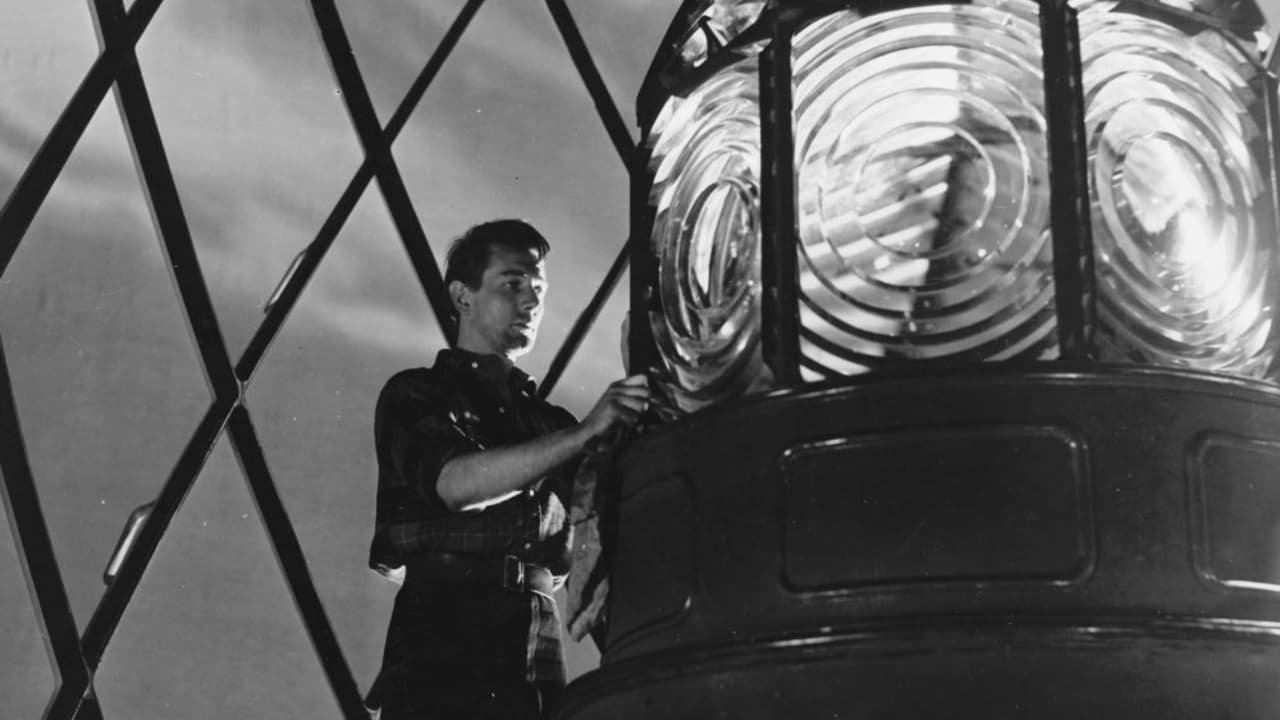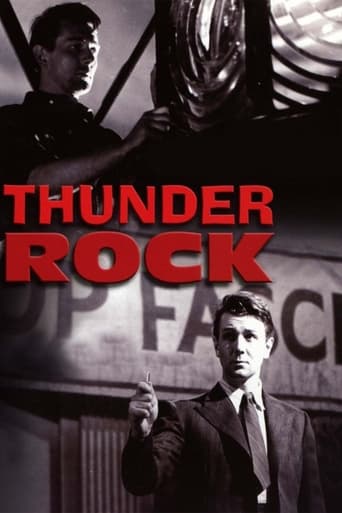

Critique: Very off beat, intriguing and fascinating, allegorical tale of failure to stem the tide of fascism in 1930s leading to WWII, based on Robert Ardrey play. World-weary, embittered newspaper writer, excellently played by fine, cerebral actor Michael Redgrave, has retreated to a lonely lighthouse on Lake Michigan (!), "Thunder Rock", to isolate himself from oncoming perils of 1930s Europe. Flashbacks reveal that he has written of and predicated the dangers of fascism, but England, and the world is too complacent, not prescient. In the lighthouse there is a plaque commemorating a ship from Europe destined for America, lost in a storm on the lake in 1849. (What an emigration ship from Europe to America is doing on Lake Michigan isn't made clear.)Redgrave creates in his mind a scenario imagining the characters on that ship, exemplaries of their fields, but who are rejected, harassed, punished for trying to achieve noble ends before their time, and so they decide to flee to the New World where they would be free to pursue their goals. Redgrave wrestles with his imagined characters and ultimately comes to realize that these potentially great achievers decided (allegorically) to abandon their work by running away, just as Europe and the world would fail to rise against fascism until WWII forced them to confront reality. He then realizes that he must end his isolation and get back to the fight!Interesting to see British actors in lake maritime office not too successfully playing Americans; standout performances by Barbara Muller, whose character anticipates the woman's movement, and Frederick Volk as Pasteur-like doctor.
... View MoreThis may not be the greatest film ever made and to those who don't like the lesson it teaches it may seem to be propaganda (a negative implication) but for those who are receptive and consider what the story tells and what is its intended purpose, it is a valuable lesson beautifully presented. We are faced with a similar perfect storm as I write this brief note and yet most people who are not directly engaged refuse to see what is happening and the inevitable consequences of such refusal. Like the Redgrave character, we think that a personal disengagement will be a solution but it is not and never can be. Courage then is the lesson learned at Thunder Rock and any film that teaches it is worthy and a film that teaches it well is especially worthy. It is our loss that today's movie makers lack the perspective to make such a film for us in our time but then, if one did, he might be in personal danger so it is easier for them to decline. Therefore we are left with an old film that preaches us to have courage against a different enemy but the lesson holds. Watch it and think how it resonates. More than a worthy film, a necessary reminder and a lesson to us all.
... View MoreThe 1940s was certainly the decade where Hollywood was producing many films with psychological overtones (everything from SPELLBOUND to POSSESSED to THE SNAKE PIT), so it comes as no surprise that Britain was also delving into stories where such elements were found in some of the prominent British films of that decade--films like BLACK NARCISSUS where madness overtakes a woman's mind and leads to attempted murder. Here, it's the supernatural that takes center stage.THUNDER ROCK has an intriguing premise and deals more with the supernatural and the effect that the ghostly inhabitants of a lighthouse have on the mind of a disillusioned war correspondent during the WWII era. MICHAEL REDGRAVE is the writer who retreats to a lighthouse in Lake Michigan when he wearies of a world drifting toward fascism and loss of freedom as the Nazi menace increases. His books and speeches meet with indifference by an uncaring public. The inhabitants of the lighthouse (from an 1849 shipwreck) inspire him to have courage and go on with his life and fight for his beliefs.Unfortunately, the allegorical fable of a man visited by the spirits of dead passengers who lost their lives at sea doesn't ring true. The heavy handed treatment of a delicate theme doesn't help. In short, the story never reaches the kind of potential it had--and despite good acting by the entire cast, especially by a young MICHAEL REDGRAVE and JAMES MASON. LILLI PALMER has little to do in a minor role but look worried and decorative.Should have been a memorable film, but the tale is not smoothly told. Instead, it's both overlong and uneven, falling far short of the mark. Perhaps it worked better as a play or novel, but the screen version is too diffuse, overlong and preachy to make a lasting impression.Trivia note: In overall concept, the story is reminiscent of the play "Outward Bound" which was filmed in the '30s and remade in the '40s as BETWEEN TWO WORLDS, a more successful allegory/fantasy.
... View MoreFirst of all, THUNDER ROCK is a psychological drama, but the film has very much hidden beneath its surface. This film comes disguised as a rather peculiar fantasy tale, but the truth is that it deals with reincarnation, a fact that's already revealed in the first scenes: A message is passed on by telephone from one office clerk to another, and to another and another. Like knowledge that is transmitted from one life to another.David (Michael Redgrave) who is living completely on his own in a secluded lighthouse, finds a logbook with an old passenger list. This allows him to tune into his subconscious mind to open up the memories of his past lives. The drowned people, "immigrants from the old world": Each one of them represents a part of David's character. Each one of them could have been a person he once was in a former life. If you believe in reincarnation, this is a film you must see. However, Michael Redgrave is superb and so is the rest of the cast in this beautifully photographed film classic.
... View More